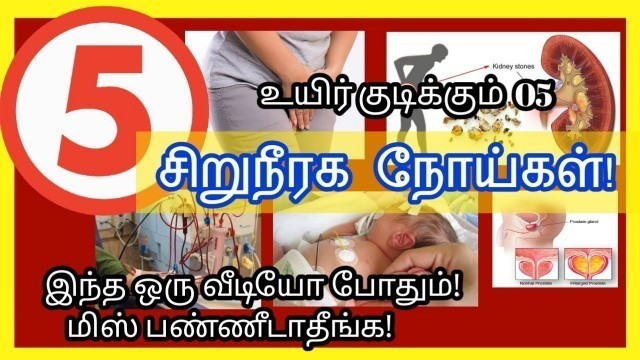

'STAR LABORATORY #kidney_disease_in_tamil 5 Main kidney diseases tamil - Kidney failure tamil ,Urine infection tamil /Kidney stone tamil / Nephrotic syndrome tamil /STARLABORATORY 5 main kidney diseases / #kidney_failure_symptoms_tamil / #urine_infection_tamil / #kidney_stone_tamil / #kidney_stone_symptoms_in_tamil / #urine_infection_symptoms_in_tamil / #kidney_infection_symptoms_tamil / #kidney_problems_symptoms_in_tamil / #kidney_stone_pain_symptoms_tamil / #nephrotic_syndrome_in_tamil Kidney failure, also known as end-stage kidney disease, is a medical condition in which the kidneys are functioning at less than 15% of normal levels.Kidney failure is classified as either acute kidney failure, which develops rapidly and may resolve; and chronic kidney failure, which develops slowly and can often be irreversible. Symptoms may include leg swelling, feeling tired, vomiting, loss of appetite, and confusion.Complications of acute and chronic failure include uremia, high blood potassium, and volume overload. Complications of chronic failure also include heart disease, high blood pressure, and anemia. Causes of acute kidney failure include low blood pressure, blockage of the urinary tract, certain medications, muscle breakdown, and hemolytic uremic syndrome. Causes of chronic kidney failure include diabetes, high blood pressure, nephrotic syndrome, and polycystic kidney disease. Diagnosis of acute failure is often based on a combination of factors such as decreased urine production or increased serum creatinine.Diagnosis of chronic failure is based on a glomerular filtration rate (GFR) of less than 15 or the need for renal replacement therapy.It is also equivalent to stage 5 chronic kidney disease.Treatment of acute failure depends on the underlying cause. Treatment of chronic failure may include hemodialysis, peritoneal dialysis, or a kidney transplant.Other recommended measures from chronic disease include staying active and specific dietary changes. A urinary tract infection (UTI) is an infection that affects part of the urinary tract. When it affects the lower urinary tract it is known as a bladder infection (cystitis) and when it affects the upper urinary tract it is known as a kidney infection (pyelonephritis). Symptoms from a lower urinary tract infection include pain with urination, frequent urination, and feeling the need to urinate despite having an empty bladder.Symptoms of a kidney infection include fever and flank pain usually in addition to the symptoms of a lower UTI. Lower urinary tract infection is also referred to as a bladder infection. The most common symptoms are burning with urination and having to urinate frequently in the absence of vaginal discharge and significant pain.These symptoms may vary from mild to severe and in healthy women last an average of six days. Some pain above the pubic bone or in the lower back may be present. People experiencing an upper urinary tract infection, or pyelonephritis, may experience flank pain, fever, or nausea and vomiting in addition to the classic symptoms of a lower urinary tract infection.Rarely, the urine may appear bloody or contain visible pus in the urine Kidney stone disease, also known as nephrolithiasis or urolithiasis, is when a solid piece of material (kidney stone) develops in the urinary tract.Kidney stones typically form in the kidney and leave the body in the urine stream. A small stone may pass without causing symptoms. If a stone grows to more than 5 millimeters it can cause blockage of the ureter, resulting in severe pain in the lower back or abdomen. A stone may also result in blood in the urine, vomiting, or painful urination.About half of people who have had a kidney stone will have another within ten years. Most stones form by a combination of genetics and environmental factors. The diagnosis is usually based on symptoms, urine testing, and medical imaging. Kidney disease, or renal disease, also known as nephropathy, is damage to or disease of a kidney. Nephritis is an inflammatory kidney disease and has several types according to the location of the inflammation. Inflammation can be diagnosed by blood tests. Nephrosis is non-inflammatory kidney disease. Nephritis and nephrosis can give rise to nephritic syndrome and nephrotic syndrome respectively. Kidney disease usually causes a loss of kidney function to some degree and can result in kidney failure, the complete loss of kidney function. Kidney failure is known as the end-stage of kidney disease, where dialysis or a kidney transplant is the only treatment option. Chronic kidney disease is defined as prolonged kidney abnormalities that last for more than three months. Acute kidney disease is now termed acute kidney injury and is marked by the sudden reduction in kidney function over seven days. About one in eight Americans have chronic kidney disease,a rate that is increasing over time.'
Tags: kidney infection , urine infection in tamil , urine infection symptoms in tamil , kidney failure symptoms in tamil , urine test tamil , kidney failure tamil , kidney problem tamil , kidney problem symptoms in tamil , kidney infection in tamil , kidney infection tamil , urine culture in tamil , urine infection tamil , kidney problems in tamil , Nephrotic syndrome tamil , urine problems tamil , urine test in tamil , kidney infection symptoms in tamil , kidney diseases in tamil
See also:

















comments